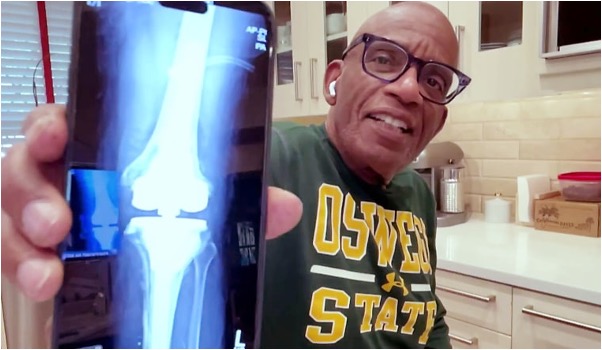Beloved TODAY Show Weatherman Al Roker Reassures Fans on Recovery After Second Knee Replacement
 People of all ages suffering with hip and knee joint pain nationwide felt hope and reassurance this week as America’s most beloved and trusted TV weatherman, Al Roker, surprised his TODAY Show co-hosts with an on-air visit to the set after recovering from a recent knee replacement surgery.
People of all ages suffering with hip and knee joint pain nationwide felt hope and reassurance this week as America’s most beloved and trusted TV weatherman, Al Roker, surprised his TODAY Show co-hosts with an on-air visit to the set after recovering from a recent knee replacement surgery.
Medically termed a “revision,” the procedure replaced Roker’s original knee replacement—which he originally had undergone over 23 years ago. Revision knee replacement surgery is performed on a person who has already undergone total knee replacement surgery.
Typically, a revision surgery requires more operative time, expertise and special equipment and has a higher risk for complications. Revision surgery involves removing the old prosthesis and replacing it with a new one. The procedure typically requires a more extensive incision and dissection.
Roker, who has openly shared his many health challenges with viewers over the years, kept his fans updated on his progress through social media posts he made from the hospital during physical therapy and also later on at home.
According to the American Academy of Orthopaedic Surgeons (AAOS), more patients are choosing to get hip and knee replacements at a younger age, indicating a general high degree of confidence in the procedure and their doctors’ abilities.
The American Association of Hip and Knee Surgeons explains that total joint replacement usually lasts between 15 and 20 years, meaning the younger patients undergoing their first joint replacement are much more likely to need revision surgery later in life like Roker, who is 68 years old.
“Fortunately, the advent of specialized instruments and techniques has improved outcomes on these complex re-do surgeries. Bone ingrowth cones and combined with modular revision implant systems and special bone grafting procedures has vastly improved our ability to reconstruct the knee and achieve an excellent and predictable result,” said Dr. William Leone, MD, FACS, founder of The Leone Center for Orthopedic Care. “Kinematic sensor technology is also being used to help diagnosis more precisely any kinematic imbalance and assess the relationship between the femoral and tibial component more precisely so any problems can be directly addressed.”
Also known for having successfully lost a significant amount of weight through walking and healthy eating, Roker said he was eager to get back to his usual exercise routines as he waits for bone growth to help stabilize his new titanium knee.
Dr. Leone counsels those who are overweight to focus on losing the extra pounds before surgery and keep in shape afterward to promote better healing and outcomes by taking pressure off the new joint.
“Indeed, most patients get out of bed and walk with supervision just hours after their surgery,” added Dr. Leone. “This is wonderfully therapeutic. Getting out of bed so quickly after surgery helps your circulation, protects your skin against pressure sores and results in an ‘I can do it’ attitude and confidence that results in a faster recovery. Most patients then go home later this day.”
For Dr. Leone’s timeline on what to expect after your hip or knee replacement surgery, click here.
About Dr. William Leone and The Leone Center for Orthopedic Care at Holy Cross Health
William A. Leone, MD, FACS, one of the nation’s top orthopedic surgeons, has operated on thousands of people from all over the world with hip and knee conditions. He takes pride in solving even the most complex hip and knee problems and is gratified by the profoundly positive effect the surgeries he has performed have had on the lives of so many patients.
The Leone Center for Orthopedic Care at Holy Cross Health is located at 1000 NE 56th Street in Fort Lauderdale. For more information or to schedule a consultation, please call 954-489-4575 or visit holycrossleonecenter.com.





